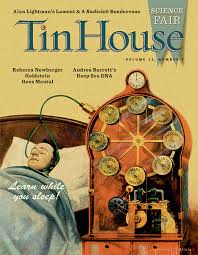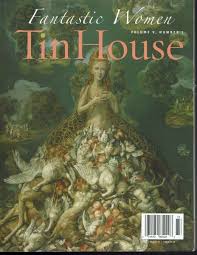Tin House
- Dec 17, 2024
- 4 min read
Updated: Oct 2, 2025
Since its founding in 1999, Tin House has established itself as a leading force in the literary world, celebrated for its bold, genre-defying works and commitment to amplifying diverse voices. What began as a quarterly literary magazine soon expanded into a multifaceted literary institution, encompassing a prestigious publishing imprint, an acclaimed creative writing workshop, and a thriving digital platform dedicated to the craft of storytelling.
Guided by a mission to break traditional publishing norms, Tin House quickly earned a reputation for publishing works that balance literary excellence with narrative accessibility. Its editors championed stories that explore the complexities of the human experience through innovative and daring perspectives.
With its distinctive thematic issues, Tin House invited readers and writers alike into curated literary worlds. Each issue explored profound themes such as “Memory,” “Lost & Found,” and “Reinvention,” offering cohesive collections that provoked thought and resonated deeply with its audience. Over the course of two decades, Tin House has become synonymous with creative risk-taking, setting a gold standard in the world of literary publishing.
A Vision Rooted in Storytelling
From its inception, Tin House sought to break traditional publishing norms by embracing stories that challenge convention and provoke thought. Co-founded by Rob Spillman, Elissa Schappell, and Win McCormack, the journal gained recognition for publishing works that blend literary depth with accessible storytelling. Its editorial team curated pieces that explore the human condition through fresh, often daring perspectives.
Issues of Tin House were distinct for their thematic focus, covering topics like “Memory,” “Lost & Found,” and “Reinvention.” This thematic approach enabled writers to explore nuanced ideas, providing readers with cohesive and thought-provoking collections.
Annual Writing Contests, Scholarships, and Prizes
Tin House is committed to discovering and supporting new literary talent through its annual writing contests. These contests provide emerging and established writers an opportunity to gain recognition and publication.
The Tin House Fiction Prize: This contest seeks outstanding short stories characterized by originality, depth, and narrative craft. The winner receives a $3,000 cash prize, publication in Tin House, and a scholarship to the Tin House Summer Workshop.
The Tin House Poetry Award: Focused on inventive and emotionally resonant poetry, this contest awards a $2,000 cash prize, publication, and a scholarship to the Tin House Poetry Workshop.
The First Book Award: Dedicated to debut authors, this award offers a book deal with Tin House Books, including publication, editorial support, and a national book tour. Past recipients have gone on to win major literary honors.
The Craft Essay Contest: This contest rewards exceptional literary essays that offer insight into the writing process. Winners receive $1,500, publication on Tin House’s website, and a feature in the Craft & Criticism series.
Without Borders Scholarship: The Without Borders Scholarship is a testament to Tin House's mission of fostering inclusivity and diversity within the literary community.
Reading Fellowship: The Tin House Reading Fellowship is a unique opportunity for emerging writers and aspiring editors to gain firsthand experience in the literary publishing industry.
Through these contests, Tin House continues its legacy of elevating unique voices and providing writers with critical support and industry visibility. These initiatives ensure that its pages remain filled with innovative, boundary-pushing literature that inspires and resonates with readers worldwide.
Publishing Legacy
Tin House has published works by some of today’s most acclaimed authors, including Jesmyn Ward, Chimamanda Ngozi Adichie, Karen Russell, and George Saunders. Many emerging writers received early recognition through the journal, launching careers that reshaped the contemporary literary landscape.
Notable pieces include:
Jesmyn Ward's Early Fiction: Her richly atmospheric short stories appeared in Tin House before she became a two-time National Book Award winner.
Karen Russell’s Surrealist Prose: Her celebrated magical realist stories found a natural home in Tin House, reinforcing her place in modern American fiction.
George Saunders' Inventive Narratives: His imaginative and socially conscious works resonated with the journal’s ethos of pushing literary boundaries.
Many of these works went on to be featured in The Best American Series and earned prestigious awards, cementing Tin House’s role in advancing literary excellence.
Amplifying New Voices
While Tin House has published literary icons, its true legacy lies in its dedication to nurturing emerging talent. The Tin House Summer Workshop, a week-long intensive program, offers emerging writers a unique opportunity to study with esteemed faculty in a supportive and creative environment. Alumni of the program include notable authors like Ocean Vuong and Brit Bennett, whose voices have shaped contemporary literature.
The Tin House Scholars Program further exemplifies this commitment by offering scholarships to writers from underrepresented communities, ensuring that the literary world remains a space for all stories to be heard.
Expanding Through Publishing
In 2005, Tin House Books was established as a natural extension of the journal’s mission. Its publishing arm has released groundbreaking works such as The Incendiaries by R.O. Kwon and Her Body and Other Parties by Carmen Maria Machado. These titles have received critical acclaim and become cultural touchstones, highlighting Tin House’s unparalleled editorial insight.
Enduring Influence
Though the print journal ceased publication in 2019, Tin House continues to influence the literary world through its publishing imprint, workshops, and online presence. Its digital platform features interviews, craft essays, and literary reviews, sustaining its role as a cultural tastemaker.
Why Tin House Matters
Tin House stands as more than a literary journal—it is a creative institution that has transformed the publishing landscape. Its dedication to literary innovation, commitment to emerging writers, and celebration of marginalized voices ensure its enduring legacy.
By fostering a space where storytelling flourishes without constraints, Tin House has proven that the power of literature extends far beyond the printed page. It remains a guiding light for writers and readers alike, a place where stories live, evolve, and inspire.










Comments